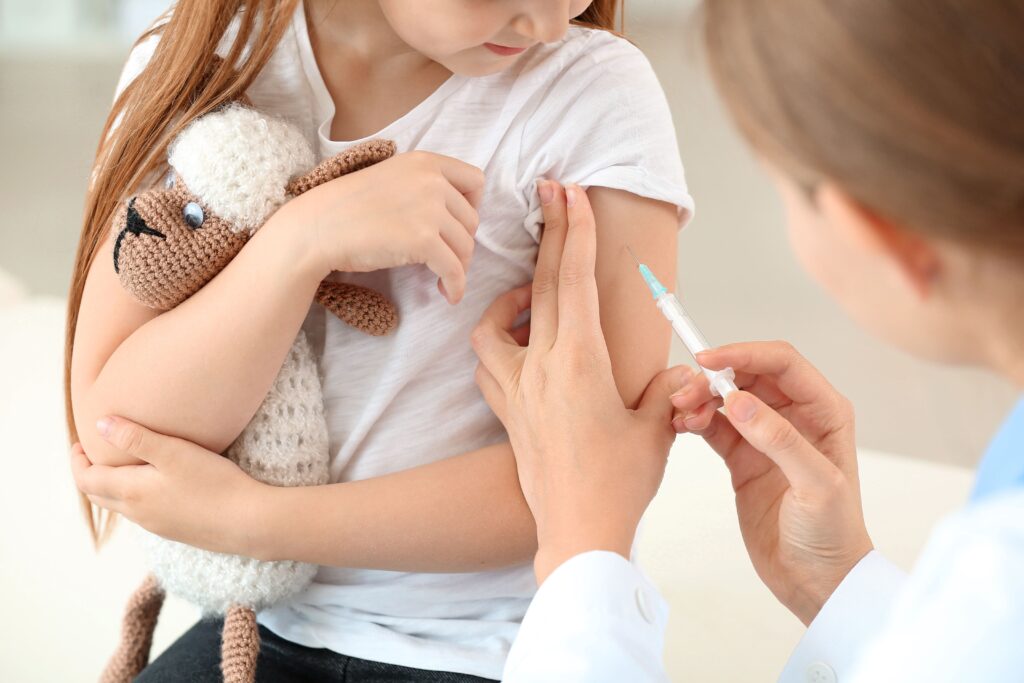Ask Dr. Dan is a blog series featuring Dr. Dan Doherty, who since 2004 has been researching Joubert syndrome through the University of Washington Hindbrain Malformation Research Program. He has agreed to answer general questions about JS posed by people with JS, their families and their caregivers. Email your questions to info@jsrdf.org. Be sure to note that your question is for Ask Dr. Dan.
By now, many adults and teenagers have the option to receive a coronavirus vaccine, and soon so will kids ages 12 to 15. Thus, it’s no surprise that many members of the Joubert syndrome community have been asking: Should people with JS get vaccinated against COVID-19?
Available evidence indicates that coronavirus vaccinations are safe and very effective at preventing severe  COVID-19 disease and death in the general population. While we don’t have hard numbers specific to JS, in my judgment, the benefits of vaccination strongly outweigh the risks. Currently, there’s no evidence that people with JS are affected by COVID-19 differently than the general population (here’s my blog on that topic). However, people with developmental disabilities are at increased risk for morbidity and mortality from most medical conditions. Thus, people with JS should be considered a vulnerable population and should be prioritized for vaccination. This will soon include youth ages 12 to 15 now that the U.S. Food and Drug Administration has approved the Pfizer/BioNTech vaccine for that age group, but younger children aren’t expected to become eligible for several months. Until then, if your family has a child with JS who isn’t yet eligible for a vaccine, other family members who are eligible should strongly consider getting vaccinated.
COVID-19 disease and death in the general population. While we don’t have hard numbers specific to JS, in my judgment, the benefits of vaccination strongly outweigh the risks. Currently, there’s no evidence that people with JS are affected by COVID-19 differently than the general population (here’s my blog on that topic). However, people with developmental disabilities are at increased risk for morbidity and mortality from most medical conditions. Thus, people with JS should be considered a vulnerable population and should be prioritized for vaccination. This will soon include youth ages 12 to 15 now that the U.S. Food and Drug Administration has approved the Pfizer/BioNTech vaccine for that age group, but younger children aren’t expected to become eligible for several months. Until then, if your family has a child with JS who isn’t yet eligible for a vaccine, other family members who are eligible should strongly consider getting vaccinated.
Medical experts widely agree that people should be vaccinated against the coronavirus. Of course, it’s understandable that some people may still be hesitant. This is a complex, rapidly evolving topic, and people simply want to ensure that they make the best choice for themselves and their families.
A recurring theme in my blog posts is that all medical decisions involve balancing risks and benefits, so let’s run them down:
Risk of coronavirus infection: Remarkably, more than 1 in 600 Americans have died from the coronavirus since the start of the pandemic. This is a staggering number. A much larger number of people have been hospitalized, and even more have missed work or school due to illness. A large, but unknown, number of people have long-term symptoms after coronavirus infection. The risks to children are lower than for adults, but almost 1% of children require hospitalization, and more than 250 deaths have been reported nationwide. On top of direct risks of coronavirus infection, people with JS can suffer indirect impacts if their family members or other caretakers are too ill to care for them.
Risk of vaccination: The Centers for Disease Control recently reported complication rates from the first 13.8 million vaccinations in the U.S. based on voluntary reports to the Vaccine Adverse Event Reporting System (VAERS), and active monitoring of vaccine recipients through a program called v-safe. While 113 deaths were reported to VAERS, 65% of them were in long term care facilities and review of available medical information for these deaths did not support a causal relationship between coronavirus vaccination and death. Severe allergic reactions were reported in 4.5 people per million vaccinations, so recipients should be monitored for at least 15 minutes after each dose to identify and treat this rare complication. More recently, an extremely rare clotting disorder has been reported mainly in women under 50 who received the Johnson and Johnson vaccine; however, the benefits of this single-dose vaccination far outweigh the risk in the majority of the population. The vaccines also have frequent side effects including fatigue, muscle aches, headache, fever and chills. So far, the only contraindication to getting the vaccine is prior severe allergic reaction to the vaccine or its components.
Benefits of vaccination: Based on clinical trials, the available vaccinations are 82-95% effective in preventing severe COVID-19 in people over 15 years old, and early data from a trial of the Pfizer vaccine in more than 2,000 children 12-15 years old revealed no cases of COVID-19 in the vaccinated group versus 18 cases in the placebo group. While infection and transmission rates were not reported for the initial trials, emerging evidence indicates that the vaccines may also decrease the spread of the virus. While concern has been raised that the vaccines may be less effective against new strains of the virus, this is an area of active research, and the vaccines are still expected to provide substantial protection.
Still unsure? Please take the time to consult with doctors who administer the vaccinations. Identify those who you trust and those who do not have financial conflicts of interest that skew their opinions (and even their view of reality). Historically, the Centers for Disease Control (CDC) has been one of the best sources of information about infectious disease, and that is still the case. And of course, if you have questions about your specific circumstances, you should discuss them with your health care provider.
And while we’re talking about COVID-19:
During the pandemic, our health has suffered in many other ways. Many of us are out of our routines, exercising less, sleeping poorly, gaining weight, getting less social support, missing healthcare maintenance and dental appointments, and not getting routine health screenings and vaccinations. Our mental health is suffering. As with other decisions, we all need to weigh the risks and benefits of self-care. In general, healthcare providers have implemented appropriate precautions, so patients should call to determine the safest way to receive routine and acute care, rather than waiting and risking further heath issues.
Resources
Coronavirus information
https://www.cdc.gov/coronavirus/2019-nCoV/index.html
Vaccine information
https://www.cdc.gov/vaccines/covid-19/index.html
Adverse events of 13.8 million vaccinations
https://www.cdc.gov/mmwr/volumes/70/wr/mm7008e3.htm
Pediatric coronavirus statistics

